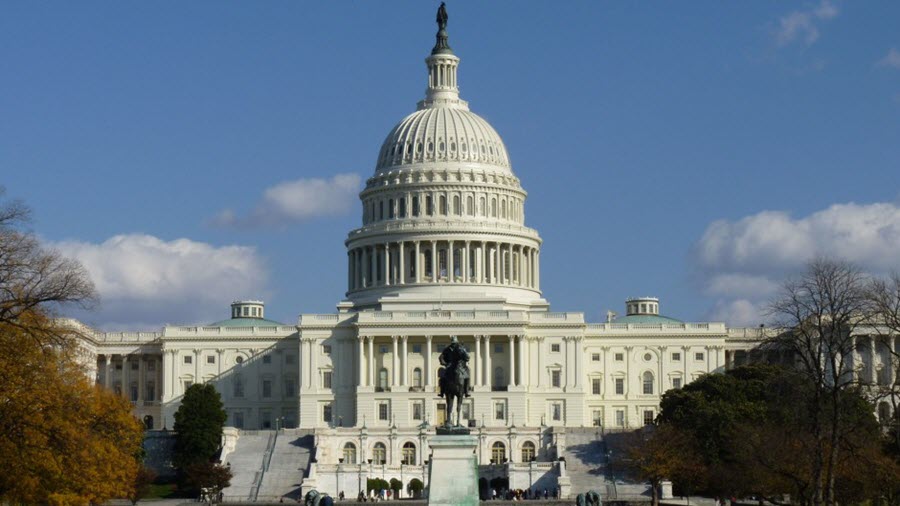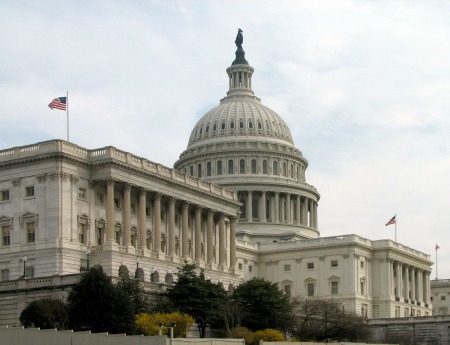D.C. Eyes T-Mobile-Sprint Meld

The smarter way to stay on top of broadcasting and cable industry. Sign up below
You are now subscribed
Your newsletter sign-up was successful
Legislators were weighing in Sunday on the announcement that T-Mobile and Sprint had struck a deal to merge, with the view of the deal depending on what side of the aisle they were sitting on, according to the early reviews from a pair of powerful Senators.
"Sprint has been a vital source of economic development and jobs in the Kansas City area for many years, and I urge the new company's leadership from the recently announced merger with T-Mobile to continue growing and innovating in Kansas," said Rep. Senator Jerry Moran of Kansas. "As the Chairman of the Commerce Subcommittee with jurisdiction over the welfare of consumers, including enforcement of certain mergers and acquisitions," he said [the Subcommittee on Consumer Protection, Product Safety, Insurance, and Data Security], "I plan to closely monitor developments beyond this announcement."

"This merger by T-Mobile and Sprint raises serious antitrust issues, and is exactly why I urged the FCC and DOJ to investigate a potential merger last year," said Sen. Amy Klobuchar (D-Minn.). "Competition among the four largest cell phone carriers has led to lower prices, better service and more innovation. I remain concerned that increased consolidation could undermine benefits to consumers."
Phillip Berenbroick, senior policy counsel at Public Knowledge, shared those concerns, and signaled the group would likely oppose the merger.
“Sprint and T-Mobile will be hard pressed to demonstrate how their combination would benefit the public interest," he said, "This task proves increasingly difficult when a merger drastically reduces competition in the wireless marketplace, as this combination certainly will.
“If approved, this deal would especially hurt consumers seeking lower-cost wireless plans, as the combined company’s plans would likely increase while competitors AT&T and Verizon would have even less incentive to lower prices," he said. "Unless the merging parties can demonstrate clear competitive benefits we have yet to see, we will urge the Department of Justice and the FCC to reject this deal.”
“This merger probably would have happened years ago if the Obama-era FCC hadn’t been so fixated on keeping four national players in the market,” said Berin Szóka president of TechFreedom, who is all for the idea. “Given Sprint’s steadily shrinking market share and T-Mobile’s modest gains, there’s just no evidence for the idea that having two weak companies in lanes three and four is better for consumers than having a stronger third competitor."
The smarter way to stay on top of broadcasting and cable industry. Sign up below
Randolph May, who heads up free market think tank, the Free State Foundation, was not ready to back the deal, but wasn't ready to say reducing the Big Four to the Big Three was a de facto non-starter.
“While I’m not prepared to take a bottom-line position on whether this merger ultimately should be approved or not, I certainly don’t agree there should be any iron-clad rule, like the one Obama Administration FCC chairman Tom Wheeler articulated, against going from four to three nationwide mobile providers," said May. "That is the wrong way to analyze the market, especially when mobile broadband increasingly is not a distinct market but rather part of a larger dynamic broadband market and when a merger of the third and fourth carriers in terms of the number of subscribers likely would make a more formidable competitor to the two largest wireless providers.”
The D.C.-based Schools, Health and Libraries Coalition was one of those registering concerns, or at least with a lot of unanwered questions about the reduction of facilities-based competition and its impact on students, anchor instititions and others."The announcement by Sprint and T-Mobile that they intend to merge raises a host of important questions for anchor institutions and for consumers," said SHLB executive director John Windhausen Jr. "How will this merger affect the delivery of data services to low-income students, especially those using the 2.5 GHz (EBS) band of spectrum? Will this merger promote greater or lesser investment in 5G networks serving anchor institutions? "What effect will the merger have on consumer prices? The SHLB Coalition encourages the Department of Justice to examine whether this merger will promote or harm competition, and encourages the Federal Communications Commission to examine the merger closely to see if it meets the public interest."
"A proposed merger between Sprint and T-Mobile would pose significant public interest harms for consumers," said former FCC Chairman Michael Copps, currently a special advisor to Common Cause, who says the deal should not be allowed. "The merger would cut the number of national wireless carriers from four to three, which would reduce competition in the wireless marketplace. Consumers would see no benefit to a marketplace where Verizon, AT&T, and T-Mobile call all of the shots. Instead, consumers can expect to pay higher prices and see fewer competitive options in the marketplace. Low-income consumers and other vulnerable communities seeking more affordable mobile communications services would be particularly hurt from the merger."
But looking like the hip "uncarriers" that will clearly continue to be the branding of the new company, T-Mobile CEO John Legere and Sprint CEO Marcelo Claure took to YouTube to promote the merger, clearly with an eye toward the Washington regulators who will have to sign off on it.
[embed]https://www.youtube.com/watch?v=1nsbmtwMrgY[/embed]
They suggested that the merger would create a maverick carrier with the scale to take on AT&T and Verizon--and Comcast and Charter--and would be the best positioned to help the U.S. lead in 5G, though if the market were defined as 5G, they were sounding like a company that would have a monopoly, but a necessary one if the U.S. were to lead in the new technology.
The execs suggested it was no longer the Big Four--AT&T, Verizon, T-Mobile and Sprint--but the Big Seven or Eight, including the cable ops getting in on the wireless action. The point, of course, is to pitch the market for wireless broadband as competitive so combining two big players won't seem threatening.
Legere said that in 5G, it was not about seven or eight, but about going from zero to one, "creating the one company that can build a 5G network America needs in the early formative years of 5G." Leger also pitched the deal as a way to boost rural broadband, another key issue for both the Trump Administration, whose Justice Department will be vetting the deal for antitrust, and the FCC, which will look beyond competition to look at the public interest benefits--like rural deployment.
T-Mobile was the biggest winner in the broadcast incentive auction of spectrum for wireless broadband.
Verizon suggested it was keeping its head down and concentrating on its own network.
“We remain focused on providing customers with the most reliable 4G network as we build them the world's first and best Ultra-Wideband 5G network – not just a proposal that may or may not happen in the next couple of years," said Verizon spokesman Richard Young. "As we've seen time and time again, there's Verizon's network and then there’s all the rest.”
Contributing editor John Eggerton has been an editor and/or writer on media regulation, legislation and policy for over four decades, including covering the FCC, FTC, Congress, the major media trade associations, and the federal courts. In addition to Multichannel News and Broadcasting + Cable, his work has appeared in Radio World, TV Technology, TV Fax, This Week in Consumer Electronics, Variety and the Encyclopedia Britannica.

